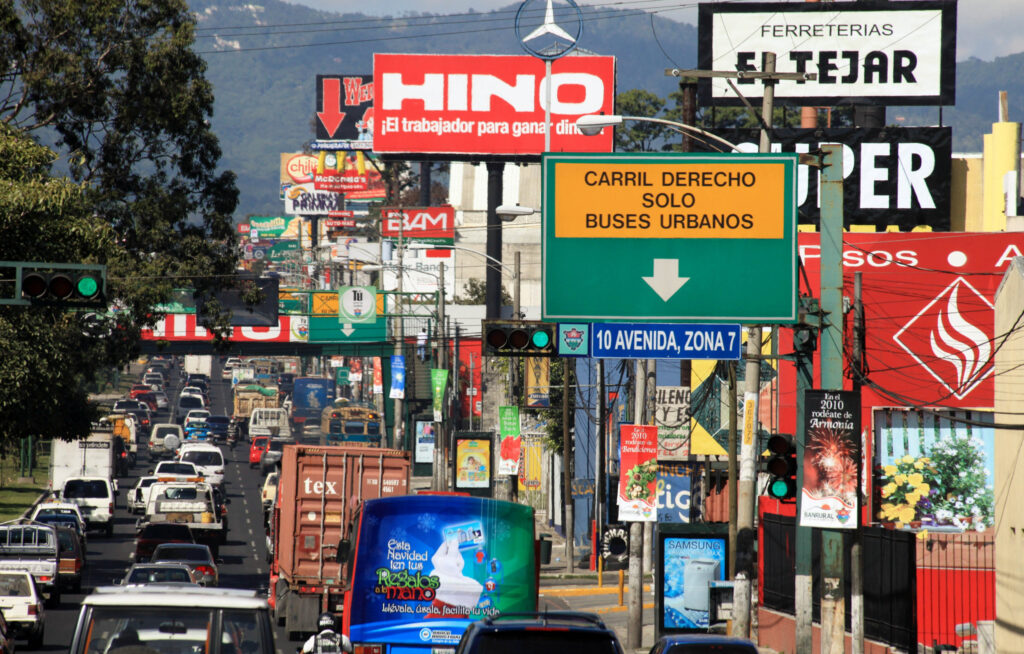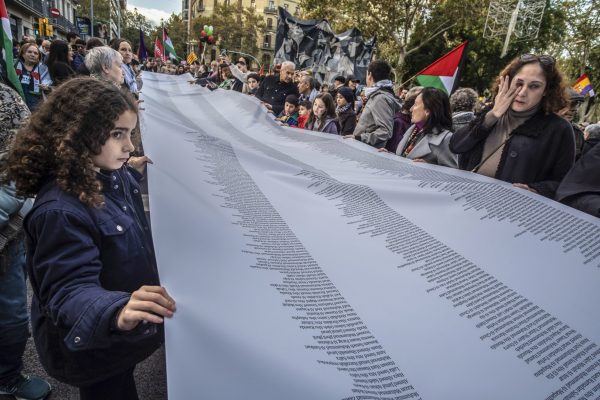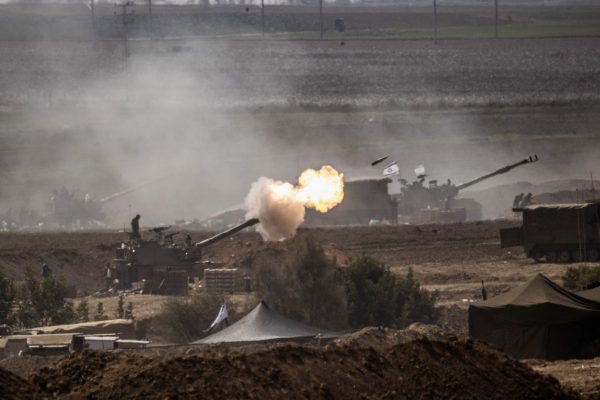At last month’s Conference on Prosperity and Security in Central America, held in Miami, the United States and Mexico met with Central American government and business leaders to discuss enhancing their countries’ security and stability. The goal was to promote prosperity through security, defined as cracking down on transnational criminal networks, combatting drug trafficking, and fostering conditions for economic growth. The conference organizers claim that, taken together, these strategies will stem the flow of desperate migrants seeking to escape poverty and violence by fleeing across the U.S. southern border.
U.S. officials at the high-level summit included Secretary of State Rex Tillerson, Department of Homeland Security Secretary John Kelly, Vice President Mike Pence, and Treasury Secretary Steven Mnuchin. Other dignitaries included Mexican Foreign Secretary Luis Videgaray, Interior Secretary Miguel Ángel Osorio, and Secretary of Finance José Antonio Meade; as well as President Jimmy Morales of Guatemala, President Juan Orlando Hernández of Honduras, and Vice President Óscar Ortiz of El Salvador. In addition, a number of American and global business leaders were present at the conference, including representatives of the U.S. Chamber of Commerce. Specifics on the conference’s proceedings are sparse, however, as the media was largely barred from attending. And yet it is at conferences such as these that the fates of millions of global citizens are often sealed.
Trump has made clear that human rights considerations are inconsequential to his foreign policy. But the human cost in Central America and Mexico will be incalculable.
A central theme of the conference was the represented nations’ “shared responsibility” to confront crisis and develop regional solutions to the instability dogging Central America. Washington, promising cooperation, acknowledged its role as the top consumer of drugs, but strongly encouraged Mexico and Central America to take the lead in fixing the region’s ills. Yet the solutions presented were not new. Instead, the ideas showcased at the conference reflect longstanding, misguided U.S. policies that have bolstered military and corporate interests—ultimately driving the very displacement the conference was ostensibly convened to curtail. Notably, the sentiments of shared responsibility and local problem-solving are sharply at odds with the America First policies heralded by Trump, who appears intent on using heavy-handed tactics to secure U.S. borders.
The Trump administration’s plan centers on intensified border militarization coupled with a retreat from development assistance. On the ground, this will likely look like an expansion of the worst of Obama’s drug-war and neoliberal policies in the region, such as massive privatization, enforced austerity, the evisceration of labor and environmental protections, and a strengthened military force to back it all up.
Trump’s proposed budget makes these priorities crystal clear. The State Department, which attaches transparency and human-rights benchmarks to aid programs it funds, is in for big cuts. Department of Defense initiatives, which are far less amenable to oversight and accountability, will see increases. Consistent with Trump’s approach to foreign policy more broadly, the strategy is to support state security forces, including the police and military, while significantly reducing development aid and the soft power it commands. As economist Jake Johnston of the Center for Economic and Policy Research (CEPR) observes, “With development assistance slashed, US diplomacy in the region will more often appear in uniform.”
As at home, Trump is interested in policies toward Central America that are profitable to private businesses and which remove impediments to their unfettered operation, an outlook CEPR’s Dan Beeton characterizes as Trump’s “grand neoliberal project.” Indeed, one of the stated objects of the conference was to “increase opportunities for U.S. businesses” and “improve conditions for U.S. and other [countries’] companies.” Such strategies, however, will only further immiserate the poor and enrich the prosperous—who in turn will be “protected” by state security forces that have long histories of disregarding the human rights of local populaces. “Aid,” in other words, will look like the security state that is so routinely produced when foreign policy promotes neoliberalism.
The Trump administration has made clear that human rights considerations are inconsequential to its foreign policy. But the human cost of these policies in Central America and Mexico will be incalculable, and will create blowback. Instead of suppressing migration and stabilizing the region, these measures will escalate the rampant violence that has sent desperate refugees fleeing from their communities to the United States in search of sanctuary, perpetuating a cycle of misery for which Washington bears significant responsibility, but from which it offers little relief.
Central America had been largely absent from U.S. headlines since the brutal conflicts of the 1980s, until a flood of refugees—mostly women and children—crossing the U.S. southern border in 2014 captured national attention. They were fleeing from brutal gangs and organized criminal groups (which were often in collusion with police), state-sponsored repression, sexual and gender-based violence, and abject poverty. To differing degrees, the primary sending countries—El Salvador, Guatemala, and Honduras, known collectively as the Northern Triangle—are plagued by corruption, impunity, and fragile institutions, and have proven incapable of providing relief from these afflictions.
As U.S. policies exacerbate suffering in Central America, it is only a matter of time before we see new waves of desperate flight.
The Obama administration responded to the deluge of migrants by ramping up repatriations and attempting to deter flight to the United States. It also embraced the Alliance for Prosperity, a plan developed by the Inter-American Development Bank and the Northern Triangle countries. The plan was aimed at ameliorating the root causes of migration—gang and drug violence, corruption and grinding economic hardship—but pursued these goals through a failed neoliberal development model. The model promoted infrastructure projects through deregulation and privatization while gutting public services; it also endorsed mostly unproven anti-corruption measures (especially in Honduras), as well as enhanced security though militarization.
Though Obama recognized the need to address the drivers of mass exodus, the programs his administration funded often failed to provide measurable and meaningful relief to the poor or to demonstrably diminish crime. Furthermore, such efforts have been critiqued for failing to meet basic criteria for good governance: many of the security initiatives promoted by Obama—such as drug raids—are shrouded in secrecy and lack mechanisms to make them accountable to the citizenry. At best, they are impossible to assess; at worst, they leave those harmed by the policies without any avenue for redress. While it is true that border crossings did drop—thanks to aggressive interdiction practices in Mexico funded by the United States through the Southern Border Plan, as well as migrants’ fears of a hostile climate stateside—conditions for both migrants and those who stayed home remained dire.
Add to this volatile scenario, then, Trump’s intention to dramatically slash funding for economic aid in Central America. His 2018 budget proposes a 30 percent decrease from the current allocation (Pentagon funding, harder to trace, may increase). To fill the gap left by the reductions, the administration is encouraging private investors and international financial institutions to step in, expecting that business investments will generate revenue, which in turn will drive economic growth that will supposedly serve the neediest.
But if history is predictive, the model will only inflame instability, not tamp it down. What’s more, this development will be implemented under crisis conditions that are exploited to usher in extreme, opportunistic policies, including the massive privatization of public resources and the evisceration of protections for those affected by the projects, maximizing corporate profits while dispossessing the poor. Honduras, for example, has privatized broad swaths of territory since the 2009 coup that ousted democratically elected president Manuel Zelaya, granting corporations concessions to land and rivers and gutting social services and labor protections. These projects frequently engender conflict, environmental degradation, displacement of local communities, and the repression of those who resist. The result is often deadly for human rights defenders, part of a disturbing global trend in which Honduras tops the murder rate for land and environmental activists.
Aid will resemble the security state that is so routinely produced when foreign policy promotes neoliberalism.
The lethal cost of intensified privatization and resource extraction, which started under Obama’s watch but will likely accelerate under Trump, was most visible in the 2016 assassination of the indigenous environmental leader Berta Cáceres in her home last March. Cáceres, a prominent environmentalist and resistance leader, was gunned down for her role in opposing a hydroelectric dam on the Gualcarque River. Among the eight arrested for her murder are three men with ties to the Honduran armed forces who received U.S. military training, along with two others linked to Desarrollos Energéticos, S.A. (DESA), the company building the contested dam. But despite intense pressure from human rights groups in Honduras and abroad, the crime’s architects have not been named. As the CEPR’s Alex Main observes, “It is likely that those ultimately responsible for Cáceres’s killing are safely perched at the top of Honduras’ social and political ladder, beyond the reach of the country’s weak and politically compromised judiciary.” In total, more than a hundred land and environmental activists have been assassinated in Honduras since the 2009 coup. The Cáceres family has repeatedly called for the suspension of U.S. security aid to Honduras, saying in a letter to the congressional Hispanic Caucus, “A government that fails to protect its citizens and whose security forces are implicated in attacks and killings of activists should not receive security funding and training from the U.S. government.”
To make matters worse, the Trump administration is also retrenching behind its support for “drug war” policies that have left a path of devastation in their wake. Much of their strategy is modeled on the Clinton-era Plan Colombia. The plan, though touted as a success by the Colombian and U.S. governments, has been widely critiqued as a human-rights disaster; it contributed to massive internal displacement in Colombia that exceeded the number of those displaced within Syria, as well as terrible repression, including the killings of human rights defenders, trade unionists, and journalists.
Lamentably, civil society groups working on the frontlines alongside affected communities were excluded from the Conference on Prosperity and Security in Central America. In a letter to Tillerson, more than a hundred domestic and international human rights, humanitarian, environmental, labor, and faith-based organizations from throughout the Americas decried the governments’ collective failure to consult with stakeholders. These groups call for any external assistance on the part of the United States to advance human rights, instead of elevating corporate and military interests. They believe that the key to long-term stability and ameliorating poverty and violence in Central America is to invite meaningful community participation and build robust democratic institutions, rather than allocating more resources to the military that has historically undermined human rights and upheld the interests of the powerful. Private investment, in partnership with the Inter-American Development Bank, the groups wrote to Tillerson, “has the potential to fuel further displacement if it lacks guarantees by governments to respect human rights, as well as the right of indigenous communities to free, prior, and informed consent and if it occurs without transparency or accountability safeguards for projects, including protections for labor rights and mitigation of environmental impacts.” If they are to ease poverty, development projects must be advanced through transparent and accountable partnerships with broad civil society participation, not by relinquishing territory and resources to corporations whose investments are protected by the state—often with military force employed under a veil of impunity.
The number of migrants from Central America headed north has dipped since the height of the crisis. Between February and May, there were 60 percent fewer migrants apprehended or stopped at the border than during the same period last year, though there was a slight uptick in May. But that temporary lull is unsustainable: as U.S. policies exacerbate suffering in the region, it is only a matter of time before we see new waves of desperate flight.
‘A government that fails to protect its citizens and whose security forces are implicated in attacks and killings of activists should not receive security funding and training from the U.S. government.’
The next surge of migrants will likely be greeted with inhumane immigration practices: increased hurdles for asylum seekers in the United States (including the expansion of expedited removal and misinformation dispensed by border control agents); deteriorating conditions of detention for migrants; and indiscriminate mass deportations. These practices often run afoul of domestic and international law protections. Also on the agenda at the Miami conference was the looming expiration of Temporary Protected Status (TPS) for Honduras and El Salvador in March 2018. Though TPS does not lead to permanent status, it is designated by the Department of Homeland Security when a country’s nationals cannot safely return home from the United States, providing group-based protections that do not require individuals to satisfy asylum criteria. Without an extension of the humanitarian program, more than 265,000 Hondurans and Salvadorans who have built lives in the United States will become newly vulnerable to Trump’s aggressive immigration policies, forcing them into the shadows. Though deportations are down slightly under Trump due to a backlog in the immigration courts, there has been sharp uptick in arrests and detentions. Many of those detained are likely to be deported to Northern Triangle countries ill equipped to absorb them, further destabilizing the region.
Another linchpin in the Trump administration’s strategy is an increased reliance on Mexico to stop migrants from reaching the U.S. border. This is despite human rights violations committed by Mexican state security forces that include widespread torture, extrajudicial assassinations, and disappearances (such as the forty-three students from Ayotzinapa whose disappearance and presumed murder remains unsolved). Furthermore, as with the United States, Mexico’s immigration practices often violate refugees’ rights under international law, providing migrants with inadequate screening for humanitarian claims, transmitting misinformation, and subjecting them to abysmal conditions of detention. Still, refugees continue to flee, hoping to evade detection by following less-traveled routes, a trend that has led to an increase in sexual and physical violence, robbery, kidnapping, and extortion, often at the hands of authorities.
Instead of doubling down on the worst of America’s past policies for the Northern Triangle, Washington should decline to support militarization that upholds the status quo and focus on solutions that respect the voices of those most affected by the region’s violence and misery. Until the United States embraces inclusive and participatory policies that are premised on a respect for human rights, the past will be prologue.








